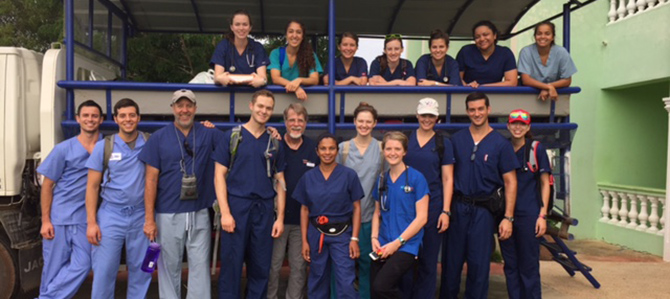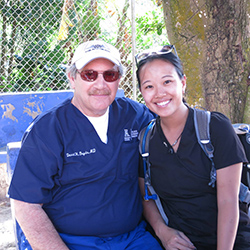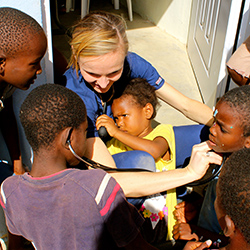
Global Health, Introducing Students to a Lesser Seen Side of Medicine

“It’s not what we bring; it’s what we leave behind.” — David Beyda, MD
That quote encompasses the mission of the UA College of Medicine – Phoenix’s Global Health Program; it’s a mantra, a testament to the spirit each and every one of the students — along with David Beyda, MD, the program’s chair — share. In those 10 words, a lifetime of dedication and service are compacted. They are what Dr. Beyda chooses to not only preach, but also practice, and they are a valuable reminder for all those students actively participating in the program itself.
Dr. David Beyda:
The aforementioned program is a reflection of its chair, because for Dr. Beyda, the understanding he wanted to be a positive light in peoples’ lives came very early. Growing up, he was exposed to a lesser seen side of medicine. His father, who served as a U.S. diplomat, traveled across the world for his work, and as a result, the family lived in varying parts of Africa and Southeast Asia, exposing Dr. Beyda to areas mired in poverty. What he witnessed left quite an impression.

These beginnings later drove him to not only volunteer working with medical groups in Laos when he was 15, but they were also indicative of what was to come. When he was 27, and still in his medical residency, Dr. Beyda served as the director of pediatrics in a refugee camp on the border of Thailand and Cambodia. Taken sequentially, this progression — from curious child to doctor in-training — is just a glimpse of a life dedicated to serving those who otherwise may be forgotten, and it’s an example of why he felt so strongly about the creation of the program here at the College.
The Global Health Program:
Currently, there are 37 students partaking in the program’s Certificate of Distinction; awarded during graduation, the distinction requires them to travel abroad twice over their four years of medical school. Its first two official graduates will walk at their Commencement this May.
Since its inception, the program has seen students practice in countries across the globe, including: Ecuador, Costa Rica, the Dominican Republic, China and India.
At their essence, though, these trips are a chance for the students to apply their medical knowledge to health care situations around the world and to learn from foreign colleagues and experts in the fields of tropical medicine, nutrition and public health; it’s an introduction to, what some would consider, a more primitive version of clinical practice.
This designation is due to the constraints typically found in these nations, but it is in those limitations the students are forced to grow and where Dr. Beyda feels the experience can be most fulfilling.
It forces them to adapt, to acclimate to a situation where the circumstances are less than ideal. In addition, Dr. Beyda noted, “It is also the opportunity for students to find that their hearts in caring for others is what drives them as physicians — to care for those who have and for those who have not.”
Developing the compassionate side to their care is significant. It enables the students to recognize the patient as a person. It’s an isolation of the greater goal, breaking down the overarching mission to single, solitary interactions. These bonds cannot be understated. They are bricks in the foundation of the quote above and a heartfelt reminder that although they inevitably won’t be able to help everyone, they did make a difference in that one life.
Truly then, Dr. Beyda is paying it forward through the program. “To do what we do, caring for those in underprivileged countries is perhaps risky business, the proverbial fool’s errand in a world so fraught with indifference, self-absorption and materialism. But with it, comes a grace and compassion that patients look for.”
A Student's Perspective:
That same sentiment is reflected in the journey of second-year student Kate Townley; her route to medicine wasn’t altogether direct, but was influenced by what she saw while working overseas. “Because I'm a non-traditional student, I had several years to gather experiences outside of medicine. Many of those same experiences pointed me [back] toward a career in medicine, and one in particular was time spent in Ethiopia.” Her job wasn’t strictly stationed in the country, yet she noticed that each time she landed there, she never wanted to leave.

Kate’s personal path to medical school is almost emblematic of the program’s aims. She saw first-hand how crucial and impactful doctors could be in those situations, and it moved her to act, “I have lived an exceptionally privileged life by the world's standards, and I feel compelled to contribute to humanity's betterment, at home and abroad.”
Through the Global Health Program, she is able to continue serving those that are less fortunate, fulfilling the passion she discovered before ever stepping foot onto the College of Medicine – Phoenix Campus. Moreover, she, as well as anyone, appreciates the positive effect their efforts are having on the people they assist.
Conclusion:
Forgotten: It’s a term that Dr. Beyda uses with consistency when writing about his enthusiasm for his global health endeavors. Because to him, no child should ever be forgotten, and through these trips, he is exposing the next generation of doctors to the dire need these countries are in for care; but he’s also exposing them a side of medicine that many of them have never seen. In turn, forgotten becomes discovered, a lesson that is learned in more ways than one.
For further background on Dr. Beyda’s travels, head to his blog. In addition, this May he will be releasing Border Crossings, a collection of stories from his trips to underprivileged countries around the globe.
Article by: Thomas Kelly
About the College
Founded in 2007, the University of Arizona College of Medicine – Phoenix inspires and trains exemplary physicians, scientists and leaders to advance its core missions in education, research, clinical care and service to communities across Arizona. The college’s strength lies in our collaborations and partnerships with clinical affiliates, community organizations and industry sponsors. With our primary affiliate, Banner Health, we are recognized as the premier academic medical center in Phoenix. As an anchor institution of the Phoenix Bioscience Core, the college is home to signature research programs in neurosciences, cardiopulmonary diseases, immunology, informatics and metabolism. These focus areas uniquely position us to drive biomedical research and bolster economic development in the region.
As an urban institution with strong roots in rural and tribal health, the college has graduated more than 1,000 physicians and matriculates 130 students each year. Greater than 60% of matriculating students are from Arizona and many continue training at our GME sponsored residency programs, ultimately pursuing local academic and community-based opportunities. While our traditional four-year program continues to thrive, we will launch our recently approved accelerated three-year medical student curriculum with exclusive focus on primary care. This program is designed to further enhance workforce retention needs across Arizona.
The college has embarked on our strategic plan for 2025 to 2030. Learn more.